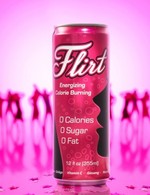
The inclusion of H.Gordonii is notable given concerns about novel ingredients in energy drinks and high caffeine levels, fears the Food and Drug Administration (FDA) aims to allay by publishing guidance distinguishing liquid dietary supplements from beverages.
According to the Flirt website: “Our proprietary formula also provides considerable nutritional value, with proven essential B vitamins and amino acids. Plus, we are the only zero-calorie beverage in the category to contain an effective appetite supplement.”
Since it has been used in Flirt on supplement grounds, H Gordonii is not subject to pre-market approval or GRAS notification. However, Goddess Energy did not reply to BeverageDaily.com’s request for information on the quality and efficacy of the ‘hoodia extract’ that it uses in its drink .
Unilever cans Hoodia project
Unilever terminated its H. Gordonii project in 2008 citing “safety and efficacy”issues, and a company-funded study (criticized in some quarters) published in the American Journal of Clinical Nutrition found the plant was no better than a placebo for affecting energy intakes or body weight among healthy overweight women.
Some non-serious adverse reactions – nausea, emesis (vomiting), disturbances of skin sensation – were also noted by the Unilever study, as well as significant increases in blood pressure, pulse and heart rate.
One top consumer health analyst told BeverageDaily.com today that he believed the FDA’s pending supplement-beverage guidance would probably be similar to an existing draft 2009, i.e. not particularly tough.
However, this document does see the FDA stress that beverages (identified as such by normal cues – packaging, store position, can size, etc.) cannot be marketed as dietary supplements.
Asked when the FDA would publish its new guidance, spokeswoman Tamara Ward told BeverageDaily.com: “We don’t have a timeline on our guidance for liquid supplements, but once a draft is available, it will definitely be made public.”
FDA policing measures
As for FDA’s responsibilities once a dietary supplement was on the market, Ward said it monitored mandatory reporting of serious adverse event reported by consumers and health professionals.
Dietary supplement firms must also report to the FDA any serious adverse effects reported by consumers or health professionals, she added.
“As its resources permit, FDA also reviews product labels and other product information, such as package inserts, accompanying literature and internet promotion.”
The FDA could take steps (via recalls, injunctions, etc.) to remove a product if it posed a safety issue, Ward said, and collected adverse event data relating to dietary supplements via its CAERS database.
“One caveat though is that temporal associations between product use and reports of adverse events do not necessarily reflect causation,” she said.
“Individuals may have used other products, and many products contain multiple ingredients. These variables complicate the evaluation and attribution of adverse events.”







